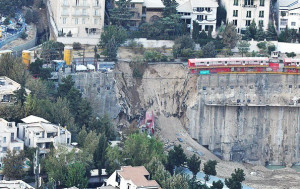October 11-13
The United States and European Union have both targeted Babak Zanjani, an Iranian businessman and soccer team owner, for helping Iran evade sanctions. Now the Iranian government is looking into allegations that he also helped himself along the way and is sitting on $2 billion in Iranian state funds.

Zanjani is 42 years old but very boyish looking and could pass for a college student. But he says he is worth $13.5 billion.
Zanjani was blacklisted by the EU last December and his American accounts were frozen by the US on April 11 for using his talents to evade sanctions. He doesn’t deny that. He is proud of it. He says he is accused of 272 instances of violating US sanctions.
That’s no crime in Iran. But still he is in trouble. He is accused of holding on to about $2 billion in funds for oil he helped the regime sell. Last week, the Majlis opened an investigation of Zanjani. Energy Committee member Musa Ahmadi said, “We cannot say who is right” as of now.
Some think Zanjani’s biggest crime is being too close to many figures high up in the government of President Ahmadi-nejad.
Zanjani operates a huge conglomerate comprised of 64 firms, some based in Iran, many based elsewhere. His holding company is the Sorinet Group, based in the UAE. He also owns the Rah Ahan Sorinet soccer team in Iran. His business covers the waterfront from cosmetics to banking, from aviation to real estate.
And he has been deftly evading sanctions, just as the EU and US say. He has been defending himself in the Iranian media by saying he did a great deal to help sell Iranian oil clandestinely and bring the profits home to Iran.
He said he charged a very modest fee for his services—just .007 percent, which would come to $165 million for the 17.5 billion euros in sales revenues he says he moved.
As for the $2 billion he is accused of pocketing, he says that money all belongs to the Iranian government. He says $700 million has already wended its way back to Iran, but the remainder is stuck aboard by the sanctions on banking transactions.
In a recent YouTube posting, he says the money is in a Hong Kong bank in an account belonging to the National Iranian Oil Co. “Transferring the money to Iran is not my concern,” he says.
Zanjani says he was asked to help out in 2010, which was two years before the tough oil sanctions were imposed in July 2012 but when many Iranian institutions like the Pasdaran had already come under sanctions.
His technique was a simple one that US officials have described before. Iranian oil is loaded onto an Iranian tanker at Kharg Island. The tanker sails out onto the high seas where it meets up with a tanker registered elsewhere and transfers the oil to that tanker. Often the second tanker already has a partial load from some other country. The second tanker then carries the oil to another port where the oil is sold as coming from Iraq or the UAE or some other country.
Many of the cargo shifts were made in an obscure harbor in the tiny Malaysian island of Labuan, the EU has charged. Reuters first noticed Iranian ships lingering some time back and publicized it as suspicious.
In Tehran, Mohammad Khoshchehreh, an economist and former Majlis deputy, told The New York Times that anyone who becomes rich fast in Iran is regarded suspiciously. “In all honesty,” Khoshchehreh said, “we don’t know whether he is a hero or a cheat.”
The reformist weekly Aseman recently interviewed Zanjani and has produced the most information on his case.
It quotes Zanjani as saying he moved 17.5 billion euros in oil from 2010 until the US sanctioned him in April and brought the money back to Iranian through 9,000 transactions. Since April, he said, he has not been able to move even 3 million barrels, which is three days worth of Iran’s exports.
Zanjani told the Iranian Students News Agency that he moved the oil and revenues from the sales, but that it was a Hong Kong bank that actually sold the oil.
Zanjani told Aseman his career started in 1999 when he became the driver for Mohsen Nurbakhsh, then the governor of the Central Bank. He discovered a talent for money changing and his moneymaking efforts took off from there.
In 2010, he said he was recruited by Khatam ol-Anbiya, the construction arm of the Pasdaran, to bring to Iran some of its money that was stuck abroad because of the sanctions against it. The Pasdaran were among the first Iranian groups sanctioned, but Zanjani’s firms were unencumbered at that time.
He was also the director of a bank in Malaysia, which he says he used as his main conduit.
As sanctions increased, other government agencies heard of him and asked for his help. His empire grew until it was hit with US sanctions in April, he said.
Some reports in Iran have said he holds a Danish passport. He denied that, saying, “The story is so badly fabricated that they even showed my passport photo without a tie, although it is required to wear a necktie for European passport photos.” There is no such EU requirement.
It is difficult to tell how much written about Zanjani is true. One account in Trend, the news agency in Azerbaijan, said Zanjani reported he set up his first company in 1980. But Zanjani turned 9 year old in 1980.